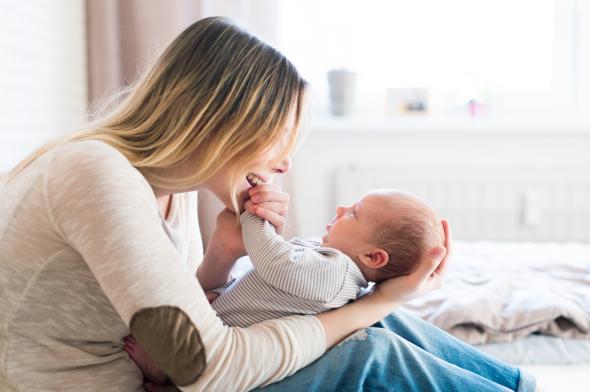In May, when psychologist Alexandra Sacks published a New York Times piece on the emotional transformations that take place when women become mothers, my own mother and multiple friends sent me the link. Despite everything other parents had told me before I had a baby (“You’ll be so tired, and watch out for signs of depression! But also, you’ll be in love”), I wasn’t prepared for the mental upheaval I’d experience. “The process of becoming a mother has been largely unexplored in the medical community,” Sacks wrote. “Instead of focusing on the woman’s identity transition, more research is focused on how the baby turns out.” Forget the baby for a minute, I thought. I want to know more about what’s happening in my own wild head.
A paper forthcoming in the Journal of Personality and Social Psychology adds more information to the small field of psychological study Sacks summarized in her piece. Researchers looked at a very large sample of Norwegian women to find out how becoming a mother (or adding children to a family) affected their self-esteem. The team, led by psychologist Weibke Bleidorn, asked almost 85,000 pregnant women to fill out questionnaires at intervals during their pregnancies and the first few years of their children’s lives.
The results showed a consistent pattern: “Self-esteem decreased during pregnancy, increased [after birth] until the child was six months old and then gradually decreased over following years.” Mothers with three-year-olds hit a low point in their self-esteem. As the study’s authors acknowledge, since women did not fill out questionnaires before getting pregnant or after their children’s third birthdays, the data has its limits. Still, the responses have a story to tell, and it’s grim.
The study’s authors write that the data shows some degree of a link between self-esteem and “relationship satisfaction”—a woman’s degree of happiness in her partnership. During pregnancy, the respondents reported a steady degree of satisfaction with their partners. This sweet period between expectant couples was followed by a steep drop-off in satisfaction after the birth of a baby, and then a slower series of decreases over the next three years. The researchers found that trends in self-esteem and relationship satisfaction often mirrored each other. Psychologists’ theories about self-esteem emphasize the importance of a sense of social belonging; when a new mother is out of step with her partner, they argue, the discord shows in her own levels of self-belief.
That said, pregnancy still takes a toll on expectant mothers’ self-esteem, due to anxiety about childbirth and the baby’s health as well as body-image issues. And even though their relationships with their partners suffered in their babies’ early months, new mothers still reported an increase in their own self-esteem. The authors of the study suggest that women might feel a sense of mastery during that first six-month period as they rapidly gain new caregiving skills.
If you’d asked me two months after my own daughter’s birth—between late-night Googling “should babby’s jaw be quivering?” and “bany pulsing vein head something wrong???”—I would have laughed at the notion that having an infant could boost her mother’s self-esteem. But now, nearing the six-month mark, I think I get it. Five- and six-month-old babies have usually settled into less punishing sleep schedules. They have learned how to smile, laugh, put their feet into their mouths, and be delightfully curious about the world around them. They’re not yet defiant, and don’t need to be disciplined. Maybe mothers’ self-esteem drops again when babies grow into toddlers, learn to walk, and start to test boundaries?
The biggest limitation to the study’s usefulness has to be its cultural specificity. “It remains an open question if similar results can be found in mothers from other countries,” the authors write, suggesting that Norway’s “family friendly policies” may help Norwegian moms evade even more drastic self-esteem dips and losses of relationship satisfaction. It’s easy to imagine that American mothers who don’t have access to good daycare and nice long maternity (and paternity!) leaves might report even more strife between partners, and concurrently higher levels of self-doubt.
State support aside, it’s interesting to consider how differences between Norwegian and American social mores around parenting might affect women living in each country. According to anecdotal observations by French and American expats living in Norway, Norwegian parenting can be a monoculture, rigid and unaccepting of deviation. (Apparently, all Norwegian kiddos go to bed at 7 pm! Slate would approve.) For all the social compulsion American moms feel to follow certain practices—breastfeeding being the prime example—our lack of agreement on things like co-sleeping and baby-led weaning means that you can usually find somebody who approves of your methods, if not on your block then online.
But what about our other particularly American sources of self-doubt? Does (white, middle-class) America’s punishing obsession with a quick physical “bounce-back” from pregnancy cause even greater self-esteem problems in our mothers? What about the confusion and guilt that can stem from the never-ending struggle to find good childcare? Or the financial pressure that pushes many American women back to work only weeks, or months, after having a child?
All speculations about cultural influences on maternal self-esteem aside, knowing that 85,000 Norwegian mothers also rode a rollercoaster of emotions after their children’s births helps me to feel like I’m in good company. One ironclad takeaway: Be sweet to the new, or new-ish, mother in your life. She probably needs it.
